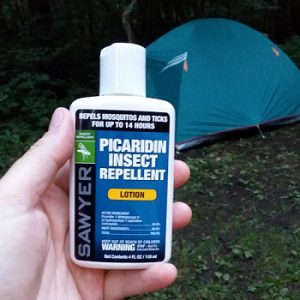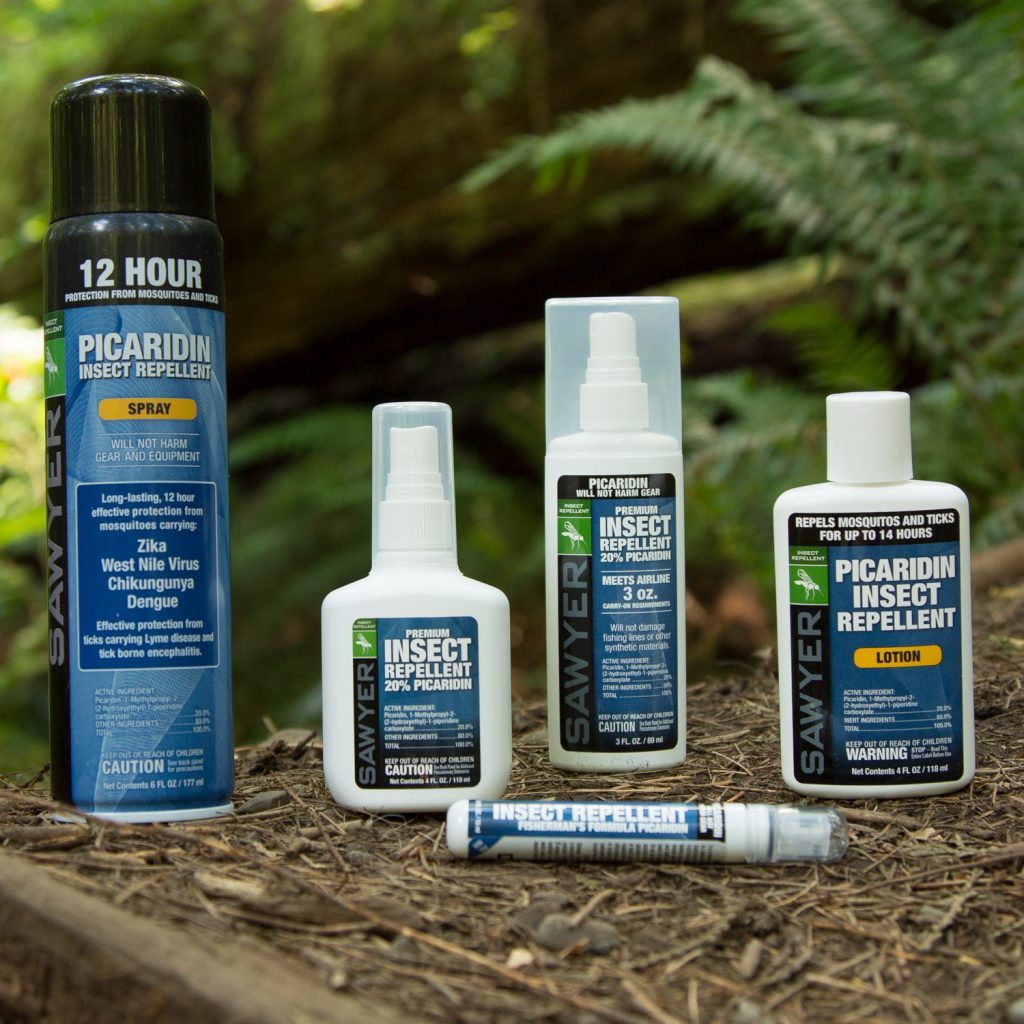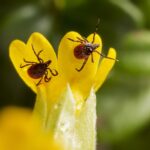
Update 2022: Recently did an update to this post that can be found here: Three Easy Ways To Deal With Ticks.
If you spend anytime outdoors you are familiar with insect repellent that has DEET in it. But you may have been hearing murmurs about Picaridin. What is Picaridin? Is it as good as DEET? Does it really work just as well or better?
I’ve used both Picaridin and DEET over the past few years and I can provide you with my personal view on both insect repellents. In addition to opinions based on use, I will also be throwing in some facts about both products.
Looking to find the best insect repellent for your next adventure into the outdoors? Then keep reading!
What Is Picaridin?
In order to answer ‘What is Picaridin’ we need to look at DEET as well. Both repellents have proven effective at fending off mosquitoes and other biting insects. For over 70 years DEET has been the go to bug repellent. Picaridin came onto the scene here in the United States in 2005 and has been giving DEET some competition.
Let’s take a look at both repellents and their pros and cons starting with DEET.
Deet – The Lowdown
In 1946 the United States Army developed DEET, (diethyltoluamide), a synthetic chemical that can provide some amazing protection for hours at a time against mosquitoes and other biting insects. It mostly consists of methylbenzoic acid, acyl chloride, thionyl chloride, and then allowing those products to react with diethylamine. Sounds nasty.
According to the EPA (Environmental Protection Agency), when DEET is properly applied it has virtually no proven side affects to cause health issues. There are some rare instances where skin rashes can occur from exposure. The last big study the EPA did on DEET was in 1998, and they concluded that DEET based repellents when applied by following label directions do not present health concerns.
DEET is available in concentrations between 4% and 100%. Depending on the concentration amount will determine how long lasting and effective it will be when applied.
DEET, THE PROS
- When applied properly as directed it has no adverse health concerns according to the EPA.
- 5% to 10% concentration will last a couple hours.
- 20% concentration can last up to five hours.
- 50%+ can last up to six or seven hours.
DEET, THE CONS
- Concentration amounts over 50% do not provide any additional or longer protection than 50% DEET.
- Creates a ‘greasy’ feel to your skin when applied.
- DEET emits a very distinctive and mostly unpleasant odor.
- DEET can dissolve certain plastics and some synthetic based materials that include vinyl, rayon, and spandex.
- Wears off fast when worn swimming or with heavy sweating (what doesn’t?).
- Buying concentrations over 50% does you nothing to help provide additional protection when using DEET.
Picaridin – The Lowdown
Picaridin was created by Bayer back in the 1980s. It’s pronounced ‘pih-CARE-a-den‘, and is a synthetic compound developed from plant extract of the genus Piper. It just so happens the plant genus is the same that produces table pepper. Now don’t let that fool you into thinking Picaridin is a natural compound – it’s not. It is a man made synthetic pesticide just like DEET.
Picaridin has been available in Europe and Australia since the 1980s, but only in the United States since 2005. It can be used on human skin and clothing and does a fantastic job at repelling mosquitoes, biting flies, ticks, fleas, chiggers, and others.
Picaridin is less likely to cause skin irritation issues than DEET, but it is still possible based on the individuals unique allergies if any. Furthermore, studies have shown Picaridin to be just as effective as DEET without the smell and the greasy/oily feeling on your skin.
PICARIDIN, THE PROS
- When applied properly it has no adverse affects health affects according to performed studies so far.
- Picaridin is odorless.
- It does not produce a greasy or oily feeling when applied directly to human skin.
- It can be used on clothing and all other substrates with worry of anything being damaged (does not dissolve plastics or synthetics).
- Lower concentrations of Picaridin have the same benefits that are akin to higher DEET percentages.
- A little goes a long way from what I have found out using it. About one ounce will keep my exposed skin protected all day, from when I rise to when I crawl back in my tent to sleep.
- Sawyer claims that 20% concentration of Picaridin can last 12 to 14 hours (I’ve found it is closer to 7-9 hours from my typical personal use).
PICARIDIN, THE CONS
- Picaridin is still relatively new, and while studies do not show adverse affects when applied properly per label instructions, it does not have the same longevity that DEET has had. Long term health risks are unknown. Where DEET has had several decades of use and study.
- It does not work as well against ticks until after they bite you. DEET preforms better in this regard.
- Like Deet, Picaridin will wear off faster if you go swimming or sweat heavily.
You can buy Picaridin online by clicking HERE.
Should You Use Picaridin Over DEET?
My personal choice is to use Picaridin over DEET. The reason for this is simple… I don’t like the lingering smell of DEET, nor do I like the oily feeling I get from using it on my skin. Picaridin doesn’t have those side affects, and I can use it without worry on my camping equipment. It also seems to last longer.
Since I am in heavy tick country I also treat my outdoor clothes and some of my gear with Permethrin. Where Picaridin does not repel ticks as well as DEET, Permethrin soaked or sprayed clothes will KILL ticks dead. So I use the combination of Picaridin and Permethrin, both Sawyer manufactured products.
Permethrin keeps ticks at bay or kills them if they contact it on my clothes or gear. Picaridin repells the pesky flying and biting insects. Great combo without the negative side affects of DEET.
What insect repellent you choose to use depends on your personal needs, as well as what you are willing to put up with (smells and greasy feeling?). Your needs may also be directed by your travel destination.
Picaridin – Lotion Or Spray
Because I typically treat all my clothes I wear into the woods with Permethrin I buy the lotion application of Picaridin. Recently I ran into some trouble with the lotion version, and wish I had bought the spray application instead.

Here is the problem I encountered: I went camping with my wife a week ago. My clothes had been treated weeks ago with Permethrin while hers were not. She used the Picaridin lotion on her exposed skin and it worked great, but she also needed to have her clothes sprayed as the mosquitoes were biting her through some areas of her clothes.
If I had the spray application of Picaridin along in my kit she would have been fine and not chewed alive by mosquitoes. You can buy a Picaridin combo pack that has both the lotion and spray applications included. The spray application can be applied to skin as well as clothes, where the lotion really can’t be applied to clothes.
Permethrin treated clothes work great against flying insects as well as ticks, but it’s not meant to be applied to your skin… so that is where I use Picaridin. Live and learn.
Check out my Permethrin review here!
What Is Picaridin – Conclusion & Where To Buy
I hope you enjoyed my review of Picaridin and found it useful. You can buy it in either the lotion or spray application at most outdoor stores across the United States. Sadly, I have found that it is more expensive buying it at local stores than when I order it online from Amazon (Free Prime Shipping Too!).
This link below will bring you to the Amazon website where you can read more interesting reviews and see the latest and greatest price, which is usually marked down.
There doesn’t seem to be much if any cost difference between DEET and Picaridin that I have seen when looking at the online prices.
If you have not tried Picaridin you may want to give a test run and do you own comparison to DEET.
TD






I haven’t gone camping for a long time because I hate mosquitoes and the smell of DEET. It’s good to see that there is an alternative. I think I will try the Picaridin and see how well it works since I would like to go camping again.
Do you know of any mosquito repellants that are all natural and free of chemical compounds?
Hi Eric,
Funny you should mention “all natural’ repellents. A few weeks ago I did try an all natural brand called Herbal Armor and was very disappointed. It just didn’t do a darn thing. Well, that’s not true. I did smell nice. But it didn’t do anything to help keep the mosquitoes away.
Lemon Eucalyptuses extract is supposed to work fairly well if you are wondering what essential oils may work. I am not at all familiar with using it, but I did research it online not to long ago and found that most people who tried it didn’t think it worked well at all. Some said it did work… so that should be taken under advisement.
For me where I do most of my stomping around outdoors the mosquitoes and ticks are pretty bad. I don’t mess around them. So I use Picaridin and Permethrin. Both work well.
TD
Dear Eric,
Thank you for your review of Picaridin. I am so excited about this product as I am allergic to DEET, hate the smell and have always wondered about the health consequences of using it. I have never heard of this product before I read your post and I am very interested in trying some and seeing if it will work for me. Thank you so much for your informative post that has offered me an insect repellent alternative, can’t wait to give it a try.
Not sure who Eric is, but thanks for reading and the comment!
I too am not a big fan of suing DEET. It smells and feels icky, in my opinion. Picaridin is much more enjoyable to use, and I don’t mind putting it on because it doesn’t reek.
TD